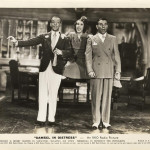The 1937 RKO movie “A Damsel in Distress” cheerfully shreds the plot of the book. But it was the book’s author, P.G. Wodehouse (best known for his Bernie Wooster/Jeeves series), who helped transform the story into a star vehicle for Fred Astaire, George Burns and Gracie Allen. And what a vehicle it is, with dancing, singing and jokes.

Fred Astaire plays a song-and-dance man named Jerry Halliday, while Burns and Allen play George Burns and Gracie Allen (We would call that post-modern; they call it vaudeville).
The book is a romantic comedy about a composer of musicals, while the movie goes one step further and is itself a musical. The music, by George and Ira Gershwin, included three songs which became standards — Things Are Looking Up, A Foggy Day, and Nice Work If You Can Get It. With a plot so light it can hardly be called a spoiler alert to say Astaire, playing a star, gets the girl. George Burns plays Astaire’s press agent and Gracie Allen is George’s secretary. Gracie plays a confused dingbat who somehow ends each scene getting what she wants.
Look for the dance sequence at a carnival, shot through funhouse mirrors. (A very different take on funhouse mirrors from the climactic scene in Orson Welles’ “Lady from Shanghai” made in 1948).
